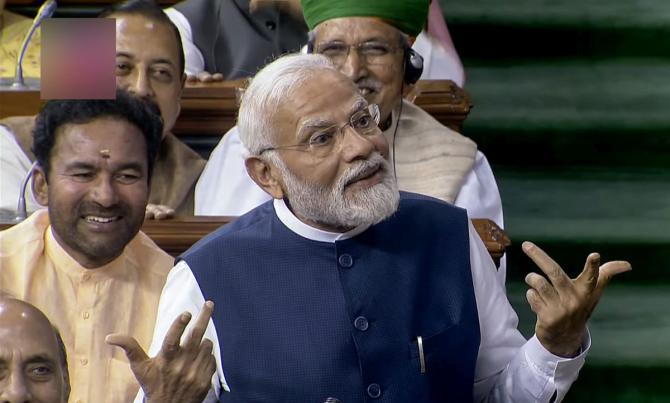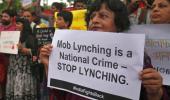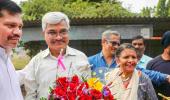August 15, 2023 became for me, an extraordinary Independence Day.
I will remember it as the day the country's largest political party -- one that struts around like a colossus and tutors us in apt behaviour -- suddenly looked bankrupt in terms of ideas and had to take out a personal guarantee from the prime minister to underscore its capacity to deliver our future, observes Shyam G Menon.

Seventy-six years after Independence, India's promise stands pegged to the guarantee of a single man.
That's what I felt on August 15, 2023 as media coverage of the prime minister's speech from Red Fort highlighted 'Modi ki guarantee'.
Without him, it appeared, we won't be among the world's biggest economies.
Two things felt awfully strange. First -- that a country of 1.4 billion people should seem so incapable of self-governance and achievement that its collective fate hinges on one man's ability to deliver.
Is the world's biggest population an overwhelmingly barren landscape as regards competence?
Second -- that such a surrendered destiny smacking of the concentrated political power found in royalty, should be the outcome of 76 years of freedom and self-rule in the world's largest democracy.
Forget, the rest of us in this country who may be the epitome of mediocrity. But what about the Bharatiya Janata Party and the pantheon of forces signifying the political Right-Wing?
Surely, they can't be so bereft of talent in their regiments of nation-builders that at the end of the day, it should all be about one person's guarantee?
The thing is, all in the hands of one saviour of a leader doesn't gel with democracy even if it makes for great narrative in the pages of history to be.
After all, when we stepped into the uncertainty of a free existence on that Independence Day in 1947, none of our leaders got reported as guaranteeing our future growth beyond securing ownership of the country and its governance, for the collective represented by us.
We were embarking on a journey together. Had our then leaders done otherwise, we may probably have faced serious problems because a guarantee for all linked to one individual's vision replaces the promise of electorate and inclusive democracy with questionable intent.
Did we fight the British to land in the hegemonic arms of someone else or did we fight to land in our own capacity to save ourselves, make India a modern, progressive, inclusive economy?
I acknowledge the compulsion for personal guarantee when one's next term of five years in government looks a bit fragile with instances of inefficiency exposed, a round of state election due in early 2024 and general elections expected less than a year away.
Under such circumstances, making an impression, counts. But still, something bothered in that simplistic reduction of economic growth to 'Modi ki guarantee.'
It seemed to forget elected representatives and the electorate. Thanks to that remark, August 15, 2023 became for me, an extraordinary Independence Day.
I will remember it as the day the country's largest political party -- one that struts around like a colossus and tutors us in apt behaviour -- suddenly looked bankrupt in terms of ideas and had to take out a personal guarantee from the prime minister to underscore its capacity to deliver our future.

It made one think -- is there a BJP or is it all Modi and Modi cult?
And if that's the case, what's the point in faulting other parties for their excessive dependence on politically influential families?
How many first days at companies have begun with the credo: 'We are a family.'
It just goes to show that in our modern world, family is a sense of loyalty (sometimes dangerous, opaque, unreasonable loyalty) that operates in more ways than just blood relation.
How is a personality cult different from a family?
It takes a brave soul to decline oneself the advantages family and cult offer. And the BJP clearly, isn't bold enough.
The current ruling dispensation at the Centre is a tripod of sorts.
There is the BJP, there is the pantheon of Hindutva forces (including the Rashtriya Swayamsevak Sangh [RSS]) and there is the personality cult around the prime minister.
At one point, there were even those who suggested that Modi had been installed in the office of prime minister by divine intervention.
Moments of being spoken to so by diehard Modi fans, stunned as window to Indian imagination. Viewed this way, the genesis and tenor of prime minister Narendra Modi's 90-minute-long speech of August 15, 2023 replete with personal guarantee, wasn't unpredictable.
Days earlier, the Opposition's no confidence motion in Parliament, had been an exercise in script foretold.
Right down to the 130 minute-reply for a no confidence motion valued more for its attempt to present what's going on, as close as possible to the nation's conscience, than any confidence in the motion's own passage.
I listened occasionally to what the political Opposition's members of Parliament said in the days leading up to the grand finale -- the prime minister's reply.

I opted to read about the prime minister's speech in the media instead of listening to it because his is the kind of public speaking that is best reviewed after the dust has settled.
Usually, such speeches impress more for the rhetoric and blasting of others than anything truly interesting.
And yet, to mistake such speeches for innocence or casualness would be a terrible mistake because the one thing that is utterly clear about the Right-Wing is that its agenda is the proverbial juggernaut.
Mostly unstoppable, when halted in its tracks and maybe denied political office, it will return to restart from where it left off.
This is why one of the less publicised news items of August 10, 2023 (the day of the 130 minute-speech), matters. According to the Web site Live Law, the central government has moved a bill to prescribe the manner in which the chief election commissioner and other election commissioners may be selected.
As per the bill, the appointment will be done by the president on the basis of recommendations by a committee composed of the prime minister, the leader of the opposition in the Lok Sabha and a union cabinet minister nominated by the prime minister.
This is at variance with the ruling of a Constitution bench of the Supreme Court in March 2023, which said the committee should be composed of the prime minister, the leader of the Opposition and the Chief Justice of India.
As anyone would note, a Cabinet minister nominated by the prime minister (any prime minister) will most likely support the latter. This makes the prime minister the dominant figure in the committee.
That is not a healthy arrangement to decide the referees of our elections.
Not to mention -- it disregards in part, the Supreme Court ruling of March by replacing the chief justice of India with a cabinet minister nominated by the prime minister.
For BJP supporters, this may seem to underscore the significance of elected representatives and the electorate, in a democracy.
They overlook how the BJP's majoritarian politics has also served to highlight the dangers it poses in committees of this sort, unless checked by agencies like the judiciary.
The bill in its current form indicates how an increasingly visible pattern of using the people's power to fence them in a compromised democracy, is sought to be furthered.
It also speaks about those at the helm of government and what the real consequences of the mandate we awarded the BJP in two successive general elections, may be. Among the strongest supporters of the BJP have been India's corporates.
The funny thing is, many of the top companies that warmed up to the BJP and have been partly responsible for sustaining a GDP-promoting, superpower-worshipping government to the expense of all its shortcomings, have protocols to minimiSe risk that won't allow putting all their investments in one basket.
Imagined similarly, what does it mean for India to have everything dovetailing (or sought to dovetail) into BJP and Prime Minister Modi along with a regimen that presents them and them alone, as our saviour, our face to the world?
It is childish.

It brings us to the most damaging aspect of the BJP's decade-old rule.
Like spinning projects by and for the taxpayer into success stories belonging to a political party and its leaders, they have made Indian politics a brazen race to usurp the power in our collective existence and recast it in the name of (and to the advantage of) whoever wins.
It gets no more brazen than how the government has structured the committee deciding referees for our elections despite the Supreme Court providing a template.
We are expected to believe that if the majority verdict in polls is permitted play without check and allowed graduation to autocracy, then the concept of electorate and democracy stands undisturbed, perhaps even vindicated.
No wonder the no confidence motion received the treatment it did with that 130 minute-speech celebrated as coup de grace.
No wonder, five days later, a personal guarantee was offered to back up our journey to being the world's third biggest economy.
Sad -- what else can one say?
Shyam G Menon is a freelance journalist based in Mumbai.
Feature Presentation: Ashish Narsale/Rediff.com











 © 2025
© 2025